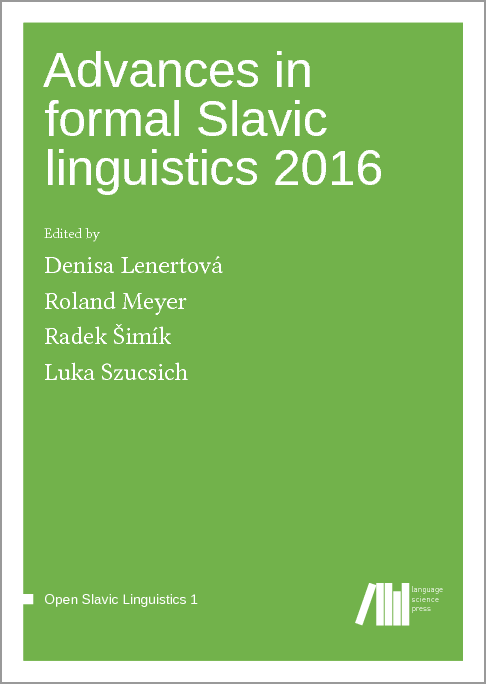We log anonymous usage statistics. Please read the privacy information for details.
Advances in formal Slavic linguistics 2016
Synopsis
Advances in Formal Slavic Linguistics 2016 initiates a new series of collective volumes on formal Slavic linguistics. It presents a selection of high quality papers authored by young and senior linguists from around the world and contains both empirically oriented work, underpinned by up-to-date experimental methods, as well as more theoretically grounded contributions. The volume covers all major linguistic areas, including morphosyntax, semantics, pragmatics, phonology, and their mutual interfaces. The particular topics discussed include argument structure, word order, case, agreement, tense, aspect, clausal left periphery, or segmental phonology. The topical breadth and analytical depth of the contributions reflect the vitality of the field of formal Slavic linguistics and prove its relevance to the global linguistic endeavour. Early versions of the papers included in this volume were presented at the conference on Formal Description of Slavic Languages 12 or at the satellite Workshop on Formal and Experimental Semantics and Pragmatics, which were held on December 7-10, 2016 in Berlin.
Chapters
-
Doubly filled COMP in Czech and Slovenian interrogatives
-
Russian datives again: On the (im)possibility of the small clause analysis
-
Imperfective past passive participles in Russian
-
Event and degree numerals: Evidence from Czech
-
A thought on the form and substance of Russian vowel reduction
-
The Russian perfective present in performative utterances
-
The nature(s) of syntactic variation: Evidence from the Serbian/Croatian dialect continuum
-
On the lack of φ-feature resolution in DP coordinations: Evidence from Czech
-
Surviving sluicing
-
The markedness of coincidence in Russian
-
Head directionality in Old Slavic
-
Perception of Bosnian/Croatian/Serbian sibilants: Heritage U.S. vs. homeland speakers. A pilot study
-
General-factual perfectives: On an asymmetry in aspect choice between western and eastern Slavic languages
-
Gender encoding on hybrid nouns in Bosnian/Croatian/Serbian: Experimental evidence from ellipsis
-
Extract to unravel: Left branch extraction in Romanian/Serbian code-switching
-
Unifying structural and lexical case assignment in Dependent Case Theory
-
Transitivity Requirement revisited: Evidence from first language acquisition
-
Number agreement mismatches in Russian numeral phrases
-
Russian case inflections: Processing costs and benefits
-
A puzzle about adverbials in simultaneous readings of present and past-under-past in Russian
-
How factive is the perfective? On the interaction between perfectivity and factivity in Polish




